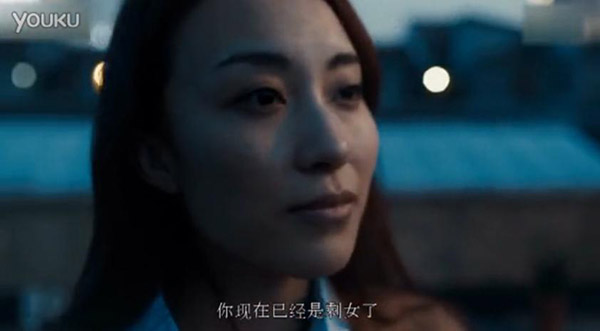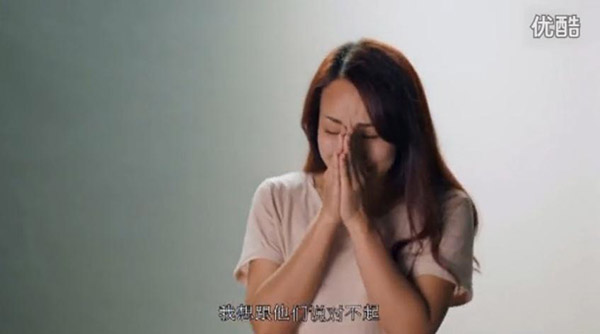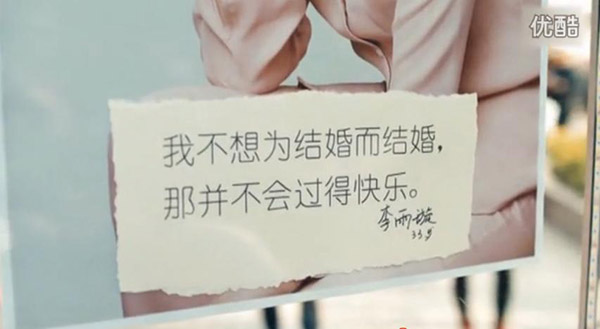 |
|
"You are a 'left-over' woman now," reads a screen shot from SK-II's "Change Destiny" advert. [Photo/Youku.com] |
A tender and penetrating look at the fraught term "leftover women" in a documentary style, Japanese skincare brand SK-II's latest "Changed Destiny" ad clearly hit a nerve.
The four-minute video has taken Chinese social media by storm and sparked off another round of discussions over an increasingly noticeable group in China - single women at a marriageable age.
The campaign depicted unmarried women's struggles, a hot-potato topic in China that might sting some of the brand's targeted clients and lead to wider discussions beyond the topic to feminism and social change.
"Sheng nv", or "left-over women", is a derogatory term coined to label unwelcome women over the age of 27 who stay unmarried. Many of them fit the profile of being well-educated, career-minded and financially independent single female urbanites.
This relatively new, affluent class is one of the products of China's three-decade economic boom and social change. The rise of this group conflicts directly with traditional Chinese society which, in terms of women's roles, prioritizes marriage and motherhood. For bastions of traditional family values, these women, though in many criteria outstanding, are still labeled as losers simply because they don't wear a ring, yet.
The crux of the video featured the tension between worried and sometimes pushy parents and single daughters who were caught in between pursuing their own lifestyle and the guilt of disobedience.
For Chinese women, marriage is by no means a personal choice. It's a family issue. In a hierarchical family, still the social norm in China, children are supposed to be submissive. In the SK-II ad several single women opened up about the pressure they faced.
 |
|
"I owe them an apology," a woman said, breaking down with tears. [Photo/Youku.com] |
"I can't die peacefully without seeing you married," a father threatened.
"Staying unmarried is definitely one way of showing disrespect to parents," a woman confessed. Later she broke down with tears, saying, "I am so selfish. I owe them an apology."
The emotional climax of the video is when parents and daughters reconcile, going down to People's Park in Shanghai, a public leisure venue also known as a "dating market" where parents exchange information of their single children, such as job, salary and age with one another and arrange blind dates for them.
Posters featuring photos of these daughters, together with empowering messages such as: "I don't want to get married only to get married. This kind of marriage doesn't make me happy" are hung prominently in the space where parents usually "market" their children.
At the end of the video, one woman pinpointed the theme of the ad: "To be independent and confident and enjoy life."
 |
|
An empowering message reads: "I don't want to get married only to get married. This kind of marriage doesn't make me happy." [Photo/Youku.com] |
The video, described by many as tear-jerking, has earned more than 5,000 kudos on SK-II's official Weibo account and attracted mostly positive comments.
A Weibo user called AmeChang posted on the microblogging site: "Being single is nothing to fear. What should be feared is to do what you are expected to and what makes you unhappy. Marriage is something you are entitled to but not indebted to. It's not like only with marriage is your life complete."
Besides the clever timing of its release – it coincided with a headline-grabbing hotel assault case that provoked outrage nationwide about violence against women, the advert rode on the wave of a new marketing strategy.
The Japanese brand joined a host of consumer product companies and beauty brands with ads that sell ideas such as gender equality and women's rights alongside their products. Personal care brands Pantene, Dove and Always have led the way in such campaigns.
 |
|
Screen shot of P&G Always' "Like A Girl" advert. [Photo/Iqiyi] |
For example, P&G Always' "Like A Girl" ad showed how the phrase "like a girl" is perceived by young women, boys and girls, and had a similar impact in the USA in causing people to reflect on gender issues.
Instead of promoting the product's quality, these ads get touchy-feely by raising a topic the targeted clients can relate to personally.
SK-II's previous commercials featured actresses showing off their immaculate skins and sharing their own user experiences. Marketed as having age-defying effects, the brand's skin care lines have been pitched at women who deal with mature skin and thus have bigger purchasing power.
Some users compared the Changed Destiny campaign with a controversial advert of Baihe, a dating website, which was showered with criticism for guilting women into compromising with traditional values. The older ad showed how an ill grandmother managed to get her single granddaughter to give in by constantly nagging the younger woman. In contrast, the SK-II ad encouraged women to stay true to themselves under the pressure, ending with a morale-lifting message – don't let pressure restrict your future.
This, however, is not a happy ending. For free-spirited women, reconciliation with parents is only the first step as family is not the only source of the pressure. They have a whole society to reconcile with and to battle.
